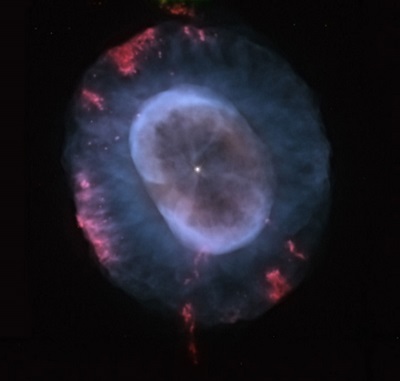NGC 7662 is a planetary nebula located in Andromeda. It's also known as the Blue Snowball Nebula or Snowball Nebula and at apparent magnitude +8.6 is one of the brightest examples of its type and therefore a popular target for both amateur and professional astronomers. NGC 7662 is positioned 0.5 degrees southwest of star 13 And (mag. +5.7) and was discovered by William Herschel on October 6, 1784. It's best seen from Northern Hemisphere latitudes and appears high in the sky during the months of October, November and December.

NGC 7662 is visible with binoculars appearing star-like. When viewed through an 80mm (3.1-inch) scope at high powers it appears slightly elliptical and greenish in colour. The non-stellar nature of the object is clearly visible. However, even on nights of good seeing it appears no more than an out of focus fuzzy green star. In total the planetary spans 32 x 28 arc seconds of apparent sky.
A 200mm (8-inch) size scope or greater at a magnification of at least 250x is recommended to show the dark centre of NGC 7662. The Blue Snowball Nebula is structurally complex and is actually a doubled ringed planetary which means it consists of a bright central ring of gas surrounded by a much larger, dimmer and hazier envelope. The other halo along with the dim central star (mag. +13) require large amateur telescopes to be seen.

Finder Chart for NGC 7662 - pdf format (credit:- freestarcharts)
Like with many planetary nebulae it's difficult to accurately determine distance. NGC 7662 is estimated to be between 2,000 and 4,000 light-years away and therefore has a spatially diameter between 0.35 and 0.70 light-years. The object is number 22 in the Caldwell catalogue.
NGC 7662 Data Table
| NGC | 7662 |
|---|---|
| Caldwell | 22 |
| Name | Blue Snowball Nebula |
| Object Type | Planetary Nebula |
| Constellation | Andromeda |
| Distance (light-years) | 2,000 -> 4,000 |
| Apparent Mag. | 8.6 |
| RA (J2000) | 23h 25m 54s |
| DEC (J2000) | 42d 32m 06s |
| Apparent Size (arcsecs) | 32 x 28 |
| Radius (light-years) | 0.175 -> 0.35 |
| Other Name | Snowball Nebula |